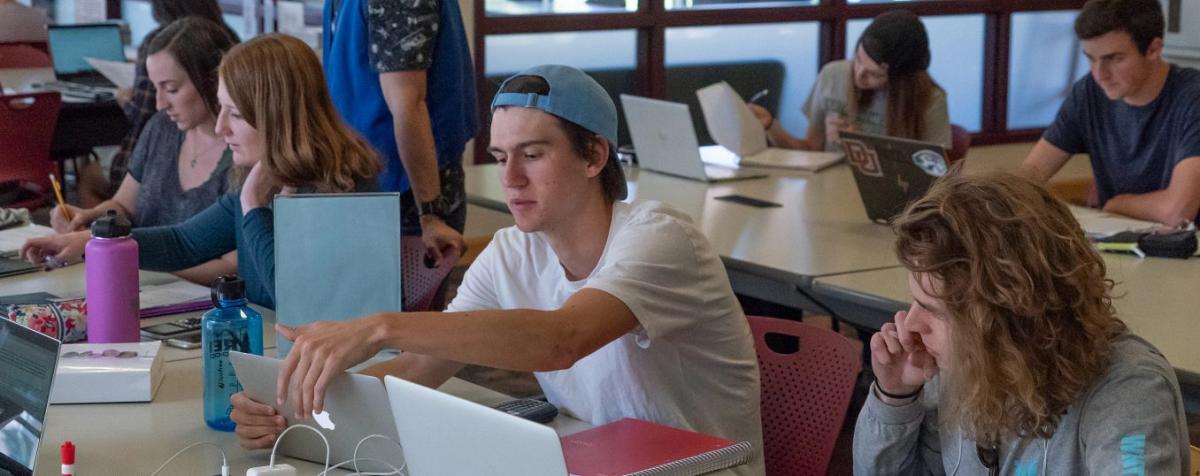About
The Department of Sociology & Criminology is determined to provide exemplary education through our degrees in sociology and criminology, and to generate research that benefits our community. We are committed to public sociology and creating research projects that can be applied in the world. Our program is proud to have many enthusiastic teachers dedicated to promoting social good and collaborating with our students on their research.
Message from the Chair
Welcome to the website of the Department of Sociology & Criminology at the University of Denver. We are an undergraduate department in the College of Arts, Humanities & Social Sciences offering BA degrees in sociology and criminology.
Our faculty are active, productive scholars with expertise in several areas of study, including crime, inequalities, law and social movements, and are national and internationally known for their contributions to the discipline of sociology.
We are also committed teachers invested in helping our majors grow and develop their academic potential. In all our classes, we help students develop a sociological imagination—an appreciation for the idea that individual action does not occur in a vacuum, but, rather, is shaped by powerful social and historical forces.
Outside the classroom, we offer many opportunities for students to use their sociological imagination by conducting their own research or working alongside faculty members. We also offer internship opportunities for course credit, which allows students to apply what they have learned in the classroom to a “course” in the community.
As a department, we value inclusive excellence, a commitment by all constituents at the University of Denver to create a transformative academic experience that embraces and engages diverse perspectives and communities. Faculty and students in our department actively contribute to these goals through scholarship, teaching and service. For more information about inclusive excellence, please view our statement below.
I hope that you will explore our website to learn more about us, what we do, and what we have to offer. Please do not hesitate to contact me with any questions.
Lisa Pasko
Associate Professor and Chair
Department of Sociology & Criminology Inclusive Excellence Statement, July 2016
The University of Denver has a vision of inclusive excellence (IE)—of comprehensively transforming the institution by valuing and engaging diversity throughout every level of the university and its colleges. The Department of Sociology & Criminology supports this vision. We respond to it through the prism of sociology and pursue it in our research, teaching and service to the University, discipline and community.
As sociologists, we employ critical perspectives on social problems, power, injustice and disparities. Our courses and research cover topics ranging from the hardships experienced by low-wage workers to the ways that political language legitimizes violence, from the social factors that entangle the most disadvantaged groups in the criminal justice system to the effects of immigration policy on the well-being of Latino/a communities. For many of us, including those of us who were first generation college students, these issues are also personal.
We believe that to achieve this vision of inclusive excellence, our work must serve the public good. Faculty members share their expertise through direct community action and public sociology. We teach service learning classes in which students partner with local, social justice organizations. We write editorials, bringing our research into public discourse. We serve as expert witnesses, lending our expertise to civil and criminal cases. And we build bridges with the greater DU, Denver, Colorado communities and beyond. Our faculty members are actively involved in university initiatives where (in)equality and inclusive excellence are the central focus. The following are a few specific examples of the ways in which faculty members engage IE in their work:
- Jared Del Rosso's research and teaching on denial examines the ways people in power downplay, minimize and outright deny the uncomfortable truths associated with inequality, disparities and atrocities.
- Hava Gordon's class on social movements, which is a service learning course, enables students to partner with a local educational justice organization that works to reduce racial inequities in public education.
- As a member of the DU Latino Center for Community Engagement and Scholarship and the Interdisciplinary Research Incubator for the study of (In)Equality (IRISE), Lisa Martinez applies her research on immigration, inequalities, and race/ethnicity and politics. These focal areas are also threaded throughout her courses and service work on various IE and diversity committees on campus and in the community.
- Scott Phillips' research uncovering racial disparities in the application of the death penalty in Texas has been used in support of specific defendants who are requesting a new trial or a new sentencing hearing, including the U.S. Supreme Court case of Duane Buck.
- Nancy Reichman focused on sources of power and privilege in her courses, considering how systems of power reproduce privilege, marginalization and inequality. Her institutional ethnography of the work schedules of low-wage workers and community work on various commissions also signify her commitment to IE.
- Trent Steidley's research and teaching on firearms violence and prevalence explores how firearm violence impacts communities that are often underrepresented politically. His recent research also explores how racial composition affects police spending on military equipment.
Inclusivity and excellence are essential to the University of Denver's mission of being a "great private university dedicated to the public good." The Department of Sociology & Criminology believes in this mission, as well as the mission of IE, and we are proud of the work our members do to support it.
For more resources on inclusive excellence at DU, see:




